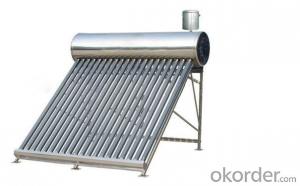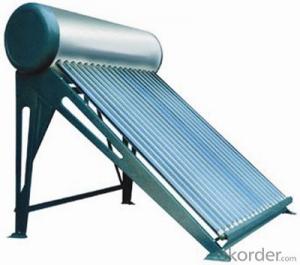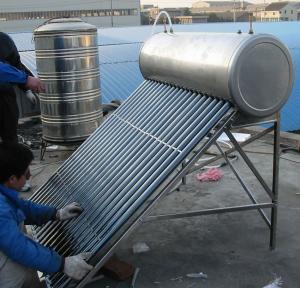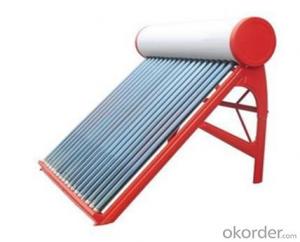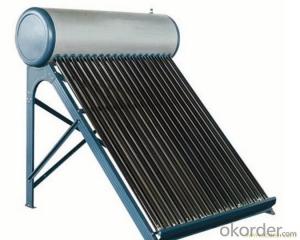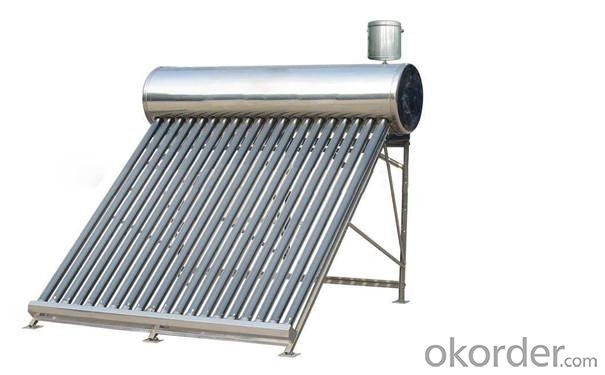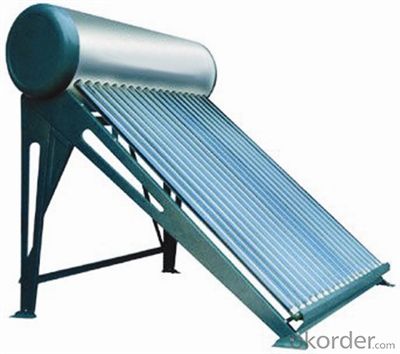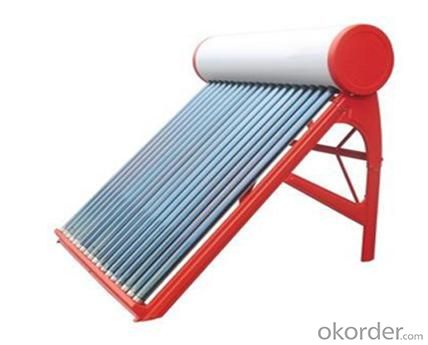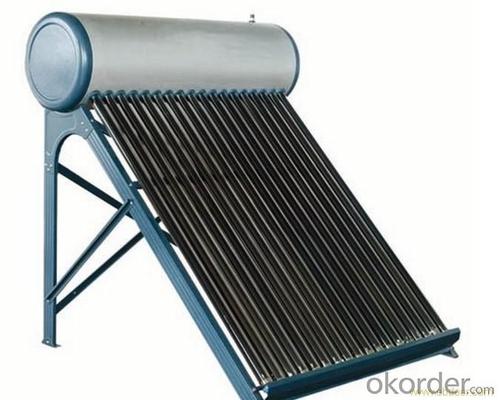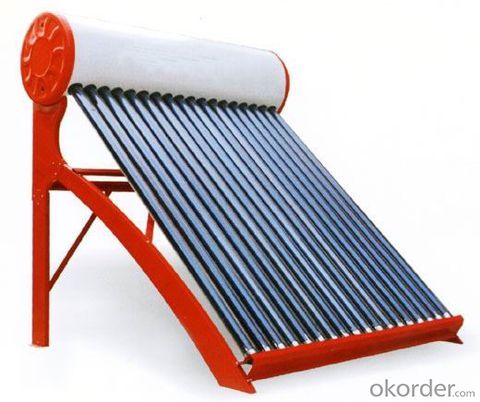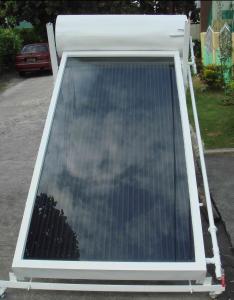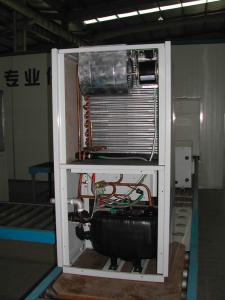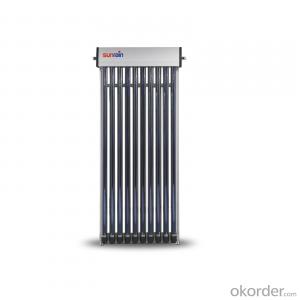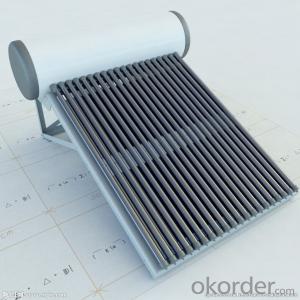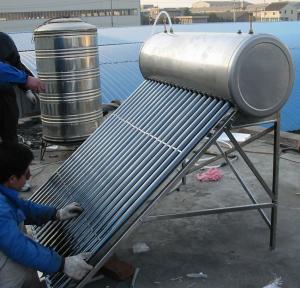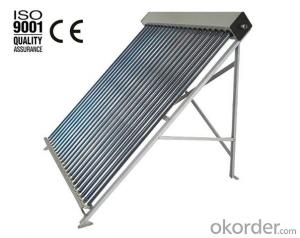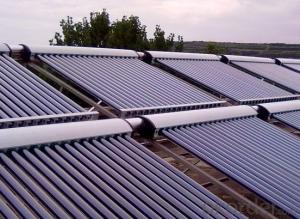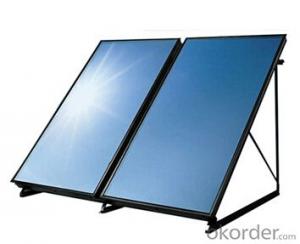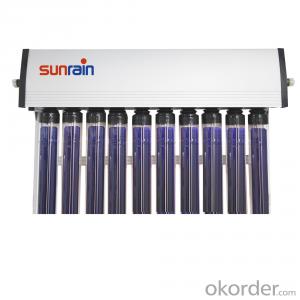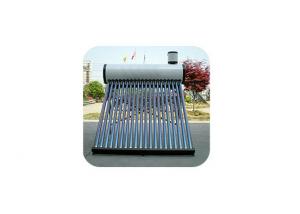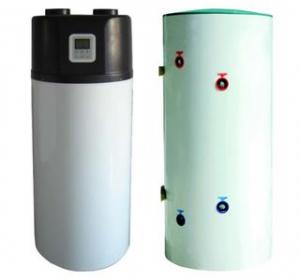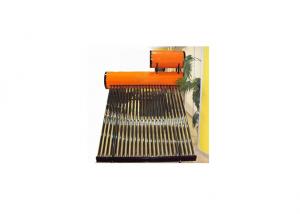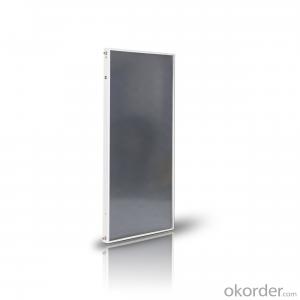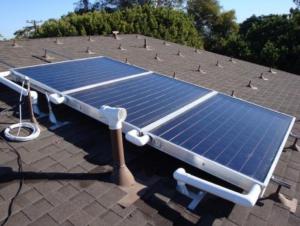Solar Water Heater Vacuum 30 Tube Solar Collector China Top Supplier
- Loading Port:
- China main port
- Payment Terms:
- TT OR LC
- Min Order Qty:
- 10 set
- Supply Capability:
- 10000 set/month
OKorder Service Pledge
OKorder Financial Service
You Might Also Like
Introduction of Non-Pressure Solar Water Heater:
Non-pressure Solar Heater is one of the most economical solar water heating device with pretty high efficiency at the same time. It consists of hot water storage tank, solar vacuum tubes with mouth plug in storage tank, and bracket supporting tank and tubes.When cold water in evacuated tubes is heated with solar irradiation, as the specific gravities of hot water and cold water are different, hotter water goes upward to storage tank and colder water goes downward to glass tubes. through this continuous circulation, the cold water in storage tank will be gradually heated till sunset.
Solar water heaters working principle
1. The solar collector absorbs solar energy and transmits it to the solar water heater tank through circulation
2. When the temperature of the collector reaches the set value, the controller starts the circulation pump automatically
3. The circulation pump makes heat-conducting liquid circulate automatically
4. The heat-conducting liquid transfers heat to water by lower heat exchanger in the water tank.
5. When the temperature difference between solar collector and heat pipe solar water heaters tank doesn't reach the set value, the circulation pump will be shut automatically
6. In case the temperature of the water tank does not reach Tmax, Electric Heating Element will start to work automatically
Solar water heaters working station component:
1. Operating screen
2. Manometer
3. Pump speed adjust switches
4. Temperature difference circulation pump
5. Flow rate indicator
6. Return circuit connector
7. Safety valve
8. Expansion vessel connector9. Return circuit connector
10. Wall mounting
11. Expansion vessel:8L
12. Pressure resistance: 10 bar pressure for expansion vessel
Solar water heaters specification:
Description | solar water heaters |
Material of out manifold | 0.55mm thickness color steel/ fluorine carbon steel |
Material of inner tank | Food grade 2.0 mm thickness SUS304 stainless steel |
Tank insulating layer | 40mm 45kg/m³ high-density polyurethane foamed |
Inlet and outlet hole | Male G1'' |
Max pressure | 0.6 Mpa |
Solar collector tube | 3.3 Borosilicate glass with N/Al coating |
Thickness of glass tube | 1.6mm |
Vacuum tube tightness | P≤0.005 Pa |
Absorption | as=0.93-0.96 (AM1.5) |
Emission ratio | εh=0.04-0.06 (80C±5C) |
Idle sunning property parameters | Y=220~260m2.C/KW |
Average heat loss coefficient | ULT=0.6~0.7W/(m2.C) |
Bracket: | 2.0mm thickness aluminum alloy |
Tank weight | 75KGS |
Tank size | 560mm Dia x 1810mm Height |
Tank capacity | 300L |
Solar collector | 2pcs 58x1800x15tube solar collector |
Absorber area | 2.811 m² |
Working station | SP116 working station |
Heat exchanger length | Upper:12m, Underside:18m |
Solar water heaters details show:
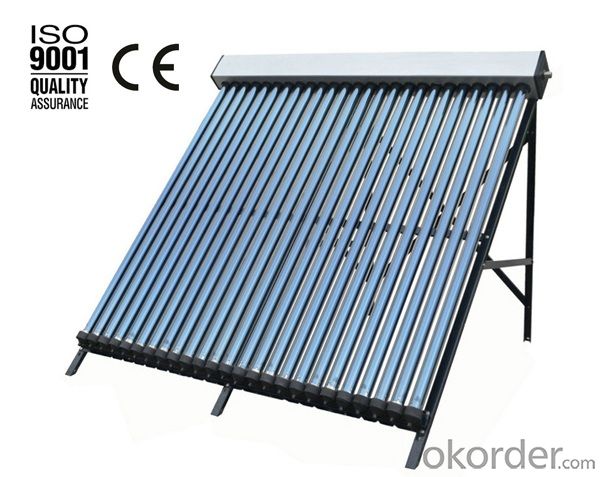
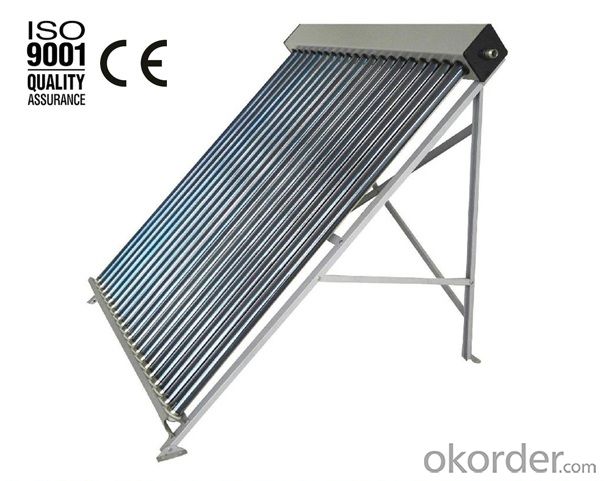
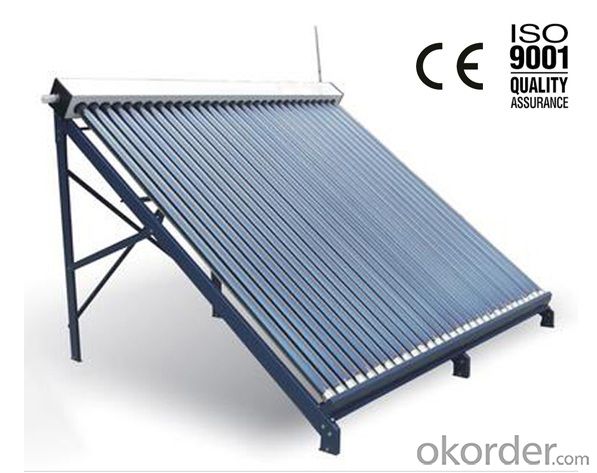
Benefits of this kind of solar water heaters:
1. Prolong the life of your existing water heater
2.Costs less than an electric, gas or oil water heater
3.No maintenance required
4.Lasts longer than a traditional hot water heater
5.Reduce your water heating costs
- Q: How does the altitude of a location affect the performance of a solar water heater?
- The altitude of a location can affect the performance of a solar water heater in a few ways. Firstly, at higher altitudes, the air density decreases, resulting in less heat transfer from the sun to the water. This means that the solar water heater may not be able to reach the desired temperature as efficiently. Secondly, higher altitudes often have lower average temperatures, which can also impact the overall performance of the solar water heater. Lastly, the lower atmospheric pressure at higher altitudes can affect the boiling point of water, which may require adjustments in the design or operation of the solar water heater.
- Q: Can a solar water heater be used in areas with high salinity water?
- Yes, a solar water heater can be used in areas with high salinity water. However, it is important to consider the potential effects of the high salinity on the system. High salinity can cause mineral build-up and corrosion, which may affect the efficiency and lifespan of the solar water heater. To mitigate these issues, it is recommended to use materials that are resistant to corrosion and to regularly maintain and clean the system.
- Q: How does a solar water heater compare to a traditional electric or gas water heater?
- A solar water heater differs significantly from a traditional electric or gas water heater in terms of its energy source and overall efficiency. Firstly, a solar water heater utilizes the sun's energy to heat the water, whereas traditional electric or gas water heaters rely on electricity or natural gas. This distinction results in a major advantage for solar water heaters as they are powered by a renewable and free energy source, making them more environmentally friendly and cost-effective in the long run. Secondly, a solar water heater typically has lower operational costs compared to traditional water heaters. Once the initial investment is made, the ongoing costs are minimal as solar energy is free. In contrast, electric and gas water heaters require continuous energy supply, which can result in higher utility bills. Furthermore, the efficiency of a solar water heater is generally higher than that of traditional water heaters. Solar water heaters can be designed to optimize heat absorption and minimize heat loss, leading to higher performance and faster heating times. This efficiency can result in a greater supply of hot water, even on cloudy or rainy days when solar energy may be less available. However, solar water heaters do have some limitations compared to electric or gas water heaters. They rely on sunlight, so their performance may be reduced in areas with limited sunlight or during the winter months. Additionally, solar water heaters require sufficient roof space or dedicated areas for installation, which may not be feasible for all households. In summary, a solar water heater offers several advantages over traditional electric or gas water heaters, including lower operating costs, higher efficiency, and a more environmentally friendly energy source. However, it's important to consider the limitations based on climate and available space before deciding which type of water heater is most suitable for a particular household.
- Q: Can a solar water heater be used in remote locations with limited access to electricity?
- Yes, a solar water heater can be used in remote locations with limited access to electricity. Solar water heaters rely on the energy from sunlight to heat water, so they do not require a constant electrical power supply. This makes them suitable for remote areas where electricity is scarce or unreliable. The sunlight is converted into heat energy through solar panels, which in turn heat the water stored in the system. Therefore, as long as there is sufficient sunlight available, a solar water heater can effectively operate in remote locations.
- Q: Can a solar water heater be used in areas with acidic water?
- Yes, a solar water heater can be used in areas with acidic water. However, it is important to ensure that the materials used in the solar water heater are resistant to corrosion caused by acidic water. Additionally, regular maintenance and proper water treatment may be necessary to prevent any potential damage or decrease in performance due to the acidic properties of the water.
- Q: Can a solar water heater be used in areas with limited access to information or education about solar technology?
- Solar water heaters can indeed be used in areas where information or education about solar technology is limited. These devices are relatively simple and can be installed and used without extensive knowledge or training. The basic principles of solar water heating are easy to understand and implement, making it accessible to a wide range of users. In such areas, community-based initiatives can play a crucial role in promoting the use of solar water heaters. Organizations, NGOs, or government agencies can organize awareness campaigns, workshops, or training sessions to educate the local population about the benefits and installation of these devices. These initiatives can help spread information and provide practical training to individuals who may not have prior knowledge of solar technology. Additionally, the use of simple instructional materials, like visual diagrams or step-by-step guides, can help bridge the information gap and make it easier for people to understand and install solar water heaters. Local technicians or installers can also be trained to assist with installation and maintenance, ensuring that the technology remains accessible to the community even without extensive knowledge or education. Overall, despite the challenges posed by limited access to information or education about solar technology, solar water heaters are suitable for use in such areas. With community-based initiatives and the availability of user-friendly materials, these devices can effectively provide clean and renewable energy for heating water in these communities.
- Q: What certifications or standards should a solar water heater meet?
- A solar water heater should meet certifications and standards such as the Solar Rating and Certification Corporation (SRCC) certification, which ensures the system's performance and efficiency. It should also meet industry standards like the International Organization for Standardization (ISO) standards for quality management and environmental management systems. Additionally, adherence to safety standards, such as UL 174 or CSA C22.2 No. 110, is crucial to ensure the heater meets electrical and safety requirements.
- Q: Can a solar water heater be used in areas with limited coal availability?
- Yes, a solar water heater can definitely be used in areas with limited coal availability. Solar water heaters utilize the energy from sunlight to heat water, eliminating the need for traditional fuel sources like coal. They consist of solar panels or collectors that absorb sunlight and transfer the heat to water, which is then stored in an insulated tank for use. As long as there is ample sunlight in the area, a solar water heater can be a highly efficient and eco-friendly alternative to coal-powered heating systems. In fact, areas with limited coal availability can benefit greatly from solar water heaters as they provide a sustainable and renewable source of hot water without relying on fossil fuels.
- Q: Can a solar water heater be used for heating swimming pools?
- Yes, a solar water heater can be used for heating swimming pools. Solar water heaters use sunlight to heat water, and this heated water can be circulated through the swimming pool to increase its temperature. It is a cost-effective and environmentally friendly method of heating pools.
- Q: Can a solar water heater be used for industrial purposes?
- Yes, a solar water heater can be used for industrial purposes. Solar water heaters can provide a cost-effective and environmentally friendly solution for heating large volumes of water required in various industrial processes such as manufacturing, cleaning, and heating. By harnessing the energy from the sun, these systems can significantly reduce the reliance on traditional fuel sources and lower operational costs for industries while promoting sustainability.
Send your message to us
Solar Water Heater Vacuum 30 Tube Solar Collector China Top Supplier
- Loading Port:
- China main port
- Payment Terms:
- TT OR LC
- Min Order Qty:
- 10 set
- Supply Capability:
- 10000 set/month
OKorder Service Pledge
OKorder Financial Service
Similar products
Hot products
Hot Searches
Related keywords
